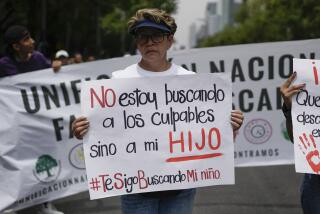Chile Largely Ignores Union Protest Call : Killing of 3 Communists at Issue; Police and Students Skirmish
- Share via
SANTIAGO, Chile — A day of protest called by union leaders against the killings of three Communist Party members drew negligible support Thursday in Chile’s capital.
Only minor skirmishes between police and student demonstrators at three university campuses and the dousing of a group of labor leaders by a water cannon gave evidence of active support for the protest gesture.
For two years, Chile has experienced a succession of such days of protest against President Augusto Pinochet’s military regime. The result has been hardening repression, increased human rights violations and censorship.
The violence was underscored when three Communist Party members--Manuel Guerrero, Jose Luis Parada and Santiago Nattino Allende--were kidnaped March 29 by unidentified armed men in vehicles without license plates. The next day, the bodies of the three were found with their throats cut in a field near Santiago’s international airport.
The funeral for the three victims, two of them schoolteachers and one a poster illustrator, drew 15,000 people to the cemetery in what was the biggest public rally of the outlawed Communist Party since the military overthrew the Marxist-led government of President Salvador Allende in 1973.
The National Workers Confederation, representing a group of union leaders headed by Rodolfo Seguel of the copper miners’ union, Manuel Bustos of the textile workers and other major labor organizations called the day of protest against the killings, which they attributed to the official security agencies.
But the movement failed to win the support of the bus drivers, so transportation was normal. Stores and banks functioned in the city, and industries in the suburbs reported no stoppages.
Even the private school where the two teachers were kidnaped held classes as usual.
“Everything is back to normal,” said Guillermo Meza, the school’s director, who refused to be interviewed. The entrance to the school in a residential neighborhood was guarded by police detectives.
The official version of the deaths of the three Communist Party members is that they were the victims of “an internal dispute” in the outlawed party.
“The orders came from abroad,” said Adm. Patricio Carvajal, the minister of defense in Pinochet’s Cabinet, referring to the exiled leadership of the Chilean Communist Party, headed by Luis Corvalan, the secretary general.
The exiled leaders announced in December that they supported all forms of resistance to the Pinochet regime, including armed violence. There has since been a series of car-bomb explosions near official buildings, sabotage of power lines and numerous armed robberies, including holdups of small banks.
The week before the three Communist Party members were kidnaped, two Chilean military officers assigned to countersubversion groups were killed when a bomb exploded in a hotel room where a clandestine radio transmitter had been detected by the intelligence services.
The two schoolteachers, Guerrero, 36, and Parada, 34, had been arrested after the armed forces seized power in 1973. Guerrero spent six years in exile in Mexico and Spain before returning here in 1982. Parada worked in the legal aid office of the Roman Catholic archdiocese of Santiago. The office has been active in defense of human rights and in the investigation of political disappearances and detentions at the hands of security agencies, which have frequently been accused of torturing prisoners.
A federal judge has been appointed by the Supreme Court to investigate the killings.
More to Read
Sign up for Essential California
The most important California stories and recommendations in your inbox every morning.
You may occasionally receive promotional content from the Los Angeles Times.










